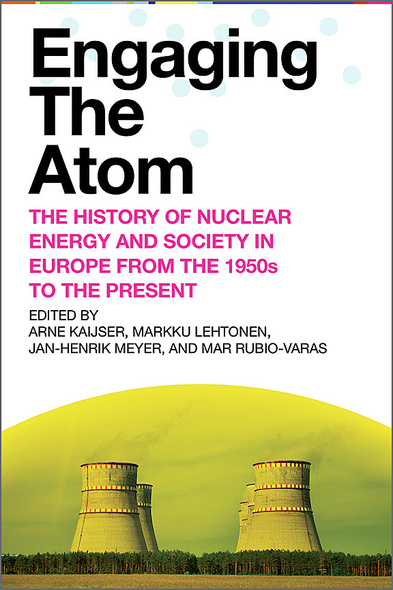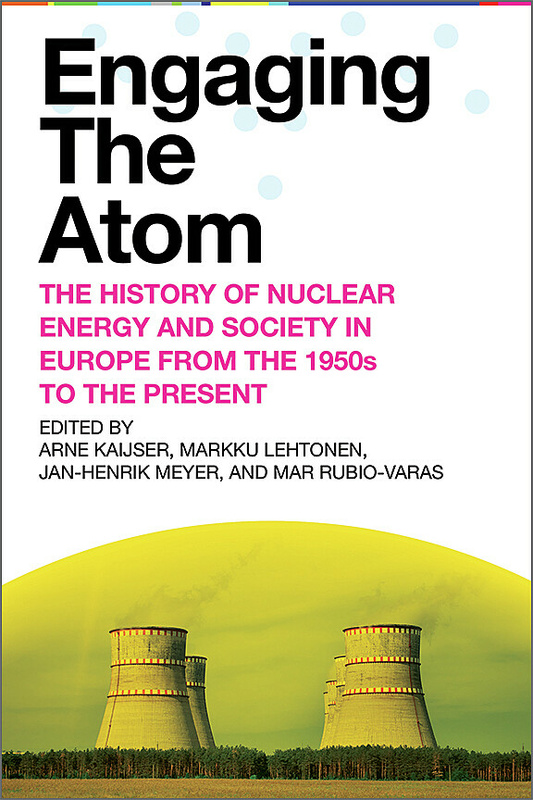Engaging the Atom
The History of Nuclear Energy and Society in Europe from the 1950s to the Present
SERIES:
Energy and Society
West Virginia University Press
Transnational perspectives on the relationship between nuclear energy and society.
With the aim of overcoming the disciplinary and national fragmentation that characterizes much research on nuclear energy, Engaging the Atom brings together specialists from a variety of fields to analyze comparative case studies across Europe and the United States. It explores evolving relationships between society and the nuclear sector from the origins of civilian nuclear power until the present, asking why nuclear energy has been more contentious in some countries than in others and why some countries have never gone nuclear, or have decided to phase out nuclear, while their neighbors have committed to the so-called nuclear renaissance. Contributors examine the challenges facing the nuclear sector in the context of aging reactor fleets, pressing climate urgency, and increasing competition from renewable energy sources.
Written by leading academics in their respective disciplines, the nine chapters of Engaging the Atom place the evolution of nuclear energy within a broader set of national and international configurations, including its role within policies and markets.
With the aim of overcoming the disciplinary and national fragmentation that characterizes much research on nuclear energy, Engaging the Atom brings together specialists from a variety of fields to analyze comparative case studies across Europe and the United States. It explores evolving relationships between society and the nuclear sector from the origins of civilian nuclear power until the present, asking why nuclear energy has been more contentious in some countries than in others and why some countries have never gone nuclear, or have decided to phase out nuclear, while their neighbors have committed to the so-called nuclear renaissance. Contributors examine the challenges facing the nuclear sector in the context of aging reactor fleets, pressing climate urgency, and increasing competition from renewable energy sources.
Written by leading academics in their respective disciplines, the nine chapters of Engaging the Atom place the evolution of nuclear energy within a broader set of national and international configurations, including its role within policies and markets.
This well-researched, clearly structured, and soundly argued book is a long-overdue historical reflection on the development of nuclear power and its interactions with civil society.’
Maria Rosaria Di Nucci, Freie Universität Berlin
Arne Kaijser is professor emeritus of history of technology at KTH Royal Institute of Technology, Stockholm.
Markku Lehtonen is Marie Skłodowska-Curie Individual Fellow at the University Pompeu Fabra in Barcelona.
Jan-Henrik Meyer is an associate professor at the Saxo Institute, University of Copenhagen.
Mar Rubio-Varas is professor of economic history at the Universidad Publica de Navarra.
Markku Lehtonen is Marie Skłodowska-Curie Individual Fellow at the University Pompeu Fabra in Barcelona.
Jan-Henrik Meyer is an associate professor at the Saxo Institute, University of Copenhagen.
Mar Rubio-Varas is professor of economic history at the Universidad Publica de Navarra.
Preface
Introduction: Nuclear Energy and Society in Postwar Europe
Arne Kaijser, Markku Lehtonen, Jan-Henrik Meyer, and Mar Rubio-Varas
Part 1: Context
1. Nuclear-Society Relations from the Dawn of the Nuclear Age
Paul Josephson, Jan-Henrik Meyer, and Arne Kaijser
2. The Changing Economic Context Influencing Nuclear Decisions
Mar Rubio-Varas
Part 2: Actors
3. One Movement or Many? The Diversity of Antinuclear Movements in Europe
Albert Presas i Puig and Jan-Henrik Meyer
4. International Organizations and the Atom: How Comecon, Euratom, and the OECD Nuclear Energy Agency Developed Societal Engagement
Paul Josephson and Markku Lehtonen
Part 3: Perspectives
5. Risky or Beneficial? Exploring Perceptions of Nuclear Energy over Time in a Cross-Country Perspective
Josep Espluga, Wilfried Konrad, Ann Enander, Beatriz Medina, Ana Prades, and Pieter Cools
6. Trust and Mistrust in Radioactive Waste Management: Historical Experience from High- and Low-Trust Contexts
Markku Lehtonen, Matthew Cotton, and Tatiana Kasperski
7. Nuclear Power and Environmental Justice: The Case for Political Equality
Matthew Cotton
8. Nuclear Energy in Europe: A Public Technology
Stathis Arapostathis, Robert Bud, and Helmuth Trischler
9. Nuclear Installations at European Borders: Transboundary Collaboration and Conflict
Arne Kaijser and Jan-Henrik Meyer
Conclusions: Future Challenges for Nuclear Energy and Society in a Historical Perspective
Arne Kaijser, Markku Lehtonen, Jan-Henrik Meyer, and Mar Rubio-Varas
Contributors
Index
Introduction: Nuclear Energy and Society in Postwar Europe
Arne Kaijser, Markku Lehtonen, Jan-Henrik Meyer, and Mar Rubio-Varas
Part 1: Context
1. Nuclear-Society Relations from the Dawn of the Nuclear Age
Paul Josephson, Jan-Henrik Meyer, and Arne Kaijser
2. The Changing Economic Context Influencing Nuclear Decisions
Mar Rubio-Varas
Part 2: Actors
3. One Movement or Many? The Diversity of Antinuclear Movements in Europe
Albert Presas i Puig and Jan-Henrik Meyer
4. International Organizations and the Atom: How Comecon, Euratom, and the OECD Nuclear Energy Agency Developed Societal Engagement
Paul Josephson and Markku Lehtonen
Part 3: Perspectives
5. Risky or Beneficial? Exploring Perceptions of Nuclear Energy over Time in a Cross-Country Perspective
Josep Espluga, Wilfried Konrad, Ann Enander, Beatriz Medina, Ana Prades, and Pieter Cools
6. Trust and Mistrust in Radioactive Waste Management: Historical Experience from High- and Low-Trust Contexts
Markku Lehtonen, Matthew Cotton, and Tatiana Kasperski
7. Nuclear Power and Environmental Justice: The Case for Political Equality
Matthew Cotton
8. Nuclear Energy in Europe: A Public Technology
Stathis Arapostathis, Robert Bud, and Helmuth Trischler
9. Nuclear Installations at European Borders: Transboundary Collaboration and Conflict
Arne Kaijser and Jan-Henrik Meyer
Conclusions: Future Challenges for Nuclear Energy and Society in a Historical Perspective
Arne Kaijser, Markku Lehtonen, Jan-Henrik Meyer, and Mar Rubio-Varas
Contributors
Index





